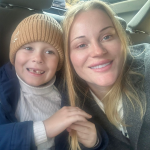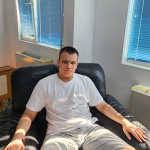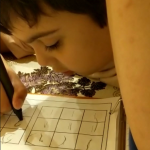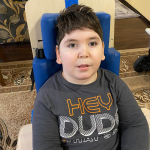Severe Forms of Autism
Classifications of autism are quite diverse and numerous. Many experts conventionally divide them into high-functioning and low-functioning autism. The latter type includes several conditions that are associated with severe stages of the disease. The final stages of autism are characterised by advanced progression with pronounced symptoms that are difficult to correct therapeutically.
But wait! Advances in modern medicine make it possible to control a patient’s condition and to significantly increase the quality and duration of life.
Severe forms of atypical autism with complex pathogenesis
- Kanner syndrome
Approximately 75% of patients with this syndrome are diagnosed with intellectiual disabilities. Specific symptoms of the disease are:
- Thoughtful, detached facial expressions;
- Aimless gaze, staring into emptiness;
- Poor facial expressions;
- Absence of emotions;
- Complete indifference to relatives.
Patients with Kanner syndrome suffer from various phobias — they may be afraid of anything in the world. They may not distinguish inanimate and animate objects. They may not be interested at all in learning. They often perceive themselves incorrectly and speak about themselves in the third person; they do not know how to use speech nor want to.
- Rett syndrome
This rarely diagnosed condition is the most apparent form of severe stages of ASD. With it, the child’s development up to the age of 1 1/2 years proceeds normally. But after this age, all skills seem to disappear. All patients with this syndrome are diagnosed with dementia. The child’s mental abilities, regardless of age, correspond to the development level of a six-month-old. Dysfunctions also affect the musculoskeletal system: kyphosis and scoliosis develop and fine motor disorders emerge. Epilepsy is also possible. Bowel problems and urinary incontinence are common. Speech skills remain at a minimal stage. A child can remember a word or even several words, but immediately forgets them. The disease can affect both girls and boys.
- Heller syndrome
Also called childhood disintegrative disorder, a child develops normally until 2 years of age, at which time acquired skills begin to degrade. This condition is irreversible and eventually leads to a complete loss of motor function.
- Hyperactive disorder in low-functioning autism
The IQ (intelligence quotient) of a patient with this disorder does not exceed 50. There is severe motor hyperactivity and extreme restlessness, such as an inability to sit still. However, such children are surprisingly socially active for the stereotypical perception of ASD — they can seek help from adults and play with peers.
Progressive stem cell treatment of childhood autism is the best way to inhibit the progression of severe ASD.
This treatment of childhood autism:
- Significantly enhances effects of other therapeutic techniques;
- Considerably slows the progression and intensity of disease development;
- Promotes cellular renewal of the brain, which improves a patient’s well-being and eliminates many symptoms of the disease.
Stem cell treatment for autism spectrum disorder in a child is rightfully considered to be the most promising and effective way to combat ASD.
Contact the Mardaleishvili Medical Centre — where your child will receive qualified medical care and a chance to live a normal life!
Autism Treatment Center Videos
Autism treatment with own stem cells
Cord blood association congress
International Quality Crown
Autism Treatment Reviews
Autism treatment with own stem cells
The story of Alessandro (6 years old)
Autism Patient Testimonial - Stem Cell Treatment
Clients Testimonials

Feedback from Igor, David’s father (12 years old) Read More

Feedback from Olga, Fedya’s mother Read More

Feedback from Natalia, Radomir’s mother (15 years old) Read More

Feedback from Esther, Samuel’s mother (8 years old) Read More

Feedback from Abibe, Selim’s mother (7 years old) Read More












